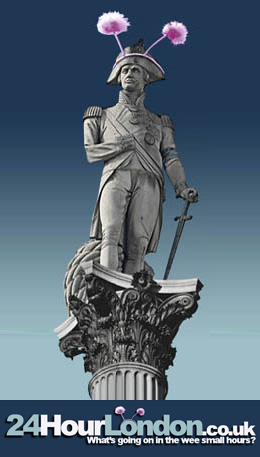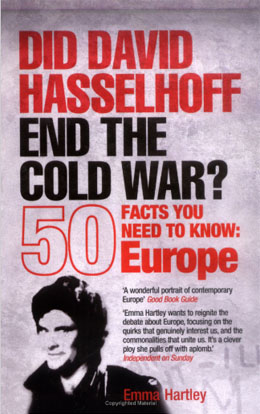Andy Cutting told a story during his gig at The Slaughtered Lamb in Clerkenwell on Monday, about his inability to read music. It was something along the lines of how he couldn't do musical notation so he can't write his tunes down and because he can't sing (he claims) it's no good trying to record them on a dictaphone either, as they all come out sounding the same: as a kind of droning noise.
It was a powerfully moving gig and it was hard to imagine anything he did musically coming out badly. So I asked him about it later and he explained that he'd learnt piano as a child but never got on with the notation side of it. "I remember doing grade two and having to choose a piece out of four on a page for sight-reading during the exam. I made a start but by the time the examiner asked me to stop I thought I'd probably finished the one I'd chosen and moved halfway through the next one. It just didn't make any sense to me." Here he is doing something lovely.
He added that he doesn't have any trouble reading or writing words and that he's not alone. Damien Barber, of The Demon Barber Roadshow, is in the same boat, as - he said - is Ralph McTell.
Barber confirmed this. "I never needed to know how to read music really, I pick it up quickly by ear. They tried me on recorder at school but I never liked it. I once entered a recorder competition and had to play a piece of music from a book. I put a book on the music stand and played it from memory - and came second.
"Now I play with other people I see the benefit. I think the band stuff would be quicker for me if I could read music but I doubt I'll ever find time to learn now. I don't know many people these days who can't do it - I think most younger musicians understand the academic side. But I'd think that most of the people I grew up with couldn't read music.
"It would certainly make arranging quicker and it would be easier to compose - I always forget the tunes I come up with because I never get around to recording them and I can't write them down. But I was impressed with the band at The Transports in Sidmouth this year - they came in and played really complicated music together just from paper. I'd like to be able to do that, but not enough to learn. I quite like being natural, though, and I think there's a nice, earthy honesty to playing by ear."
I asked how he was with other forms of language: words and numbers. "I'm good with words and I love numbers. I can be quite physically clumsy though."
We're very notation-orientated, humans in the 21st century. Writing things down to pass useful knowledge from one generation to the next is central to the story of civilisation and it's why burning books is a taboo. The internet puts a whole new complexion on things again.
Inaccurately, we say that musicians "write" music, when we mostly mean that they've come up with a tune, and a professional musician who can't write music is considered to be in some ways analogous to a famous writer - Hans Christian Anderson, Agatha Christie or WB Yeats, for instance - with dyslexia. I suspect that this is true largely because the western orchestral tradition relies on the ability to read music. So perhaps it's unsurprising that when Cutting was talking about it at the gig, his banter had a self-effacing quality.
But not everyone feels that way.
And there's this, which links through to a transcript of an interview that Eric Clapton did on the Larry King show in February 1998, in which he describes how he learnt to read music and then it "went away".
While I was putting this post together I tweeted this
and got this from John Paul White, of The Civil Wars, who I interviewed a couple of weeks ago
So I was really starting to wonder how common it is for musicians not to be able to read music?
Uncomfortably, I remember traipsing around carrying a violin case and sheet music as a youngster, feeling slightly trapped by my own inability to make the music sound perfect (the way it does on records). Perhaps when you lose the sheet music you get in touch with something more important? Joy? I did enjoy playing but found a lot of the trappings - music stands you could catch your fingers in, orchestra rehearsals at the same time every week, the drone of the tuning up - slightly oppressive.
Professor Pam Heaton is a psychologist at Goldsmith's college who went to music school. I'd been intending to ask her about neural pathways and whether the same part of the brain that is used for reading words is also used for reading music. This was mainly because I'd been sent this very interesting document about the links between dyslexia and "amusia" (which is less amusing than it sounds). I was particularly interested in the part about how there are at least three different kinds of output involved in reading and playing music: playing an instrument, which is reading music and transforming it into motor skills; singing, which is transforming visual symbols into vocal code; and naming notes, which is transforming a visual symbol into a verbal code.
But when I mentioned the number of musicians I'd heard about over the last few days who don't read music, Professor Heaton got very excited. "It's not unusual at all! We've only been writing music down since the 13th or 14th century and 150 years ago it wasn't at all uncommon for people not to be able to read words, even in our society. Music reading is a real add-on: you have to remember that a lot of musical traditions around the world are still entirely oral.
"When children learn music, sight-reading is the thing they find the hardest. But if you think about it, when you're learning to read words you go to school and you read every single day. You do it during the day and then you go home and you probably do it a bit with your mum too. You spend hundreds of hours on it.
"But no one does that with music. You have your music lesson and you do maybe an hour of sight reading in a week. And then if you are a person who hears a piece of music and remembers it when you are learning it, you wouldn't be reading it off the page. It's only if you need to read it that you will end up reading music a lot before it goes into your memory. So in a strange way becoming good at reading music is something you only really do if your memory skills aren't good: your reading skills improve because you need them.
"Perhaps also for a dyslexic musician who plays extremely well it is very burdensome to then have to go back and look at the music: it creates anxiety. The quality of your performance is not affected by your ability to sight-read. The only thing it affects is the kind of work you can do - because session musicians need it."
* If you'd like to receive posts form this blog directly into your Facebook news feed, you could make it so by *liking* its Facebook page.





No comments:
Post a Comment